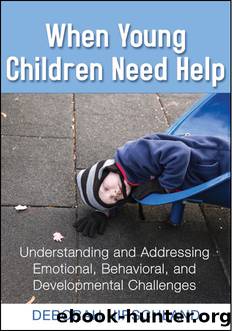When Young Children Need Help by Hirschland Deborah;

Author:Hirschland, Deborah; [Hirschland, Deborah]
Language: eng
Format: epub
Publisher: Redleaf Press
12
When Language Is Limited
Helping Two Boys Who Struggle to Communicate
Jonathan and Emilio are friends. As best they can be, that is, given how hard it is for each of them to communicate with the other. These boys first appeared in chapter 2. Jonathan is the child who spends much of his playtime at the train table, where he can be seen running trains back and forth along the track with âchoo-choosâ and âwoo-hoosâ accompanying their repetitive journeys. Emilio likes trains, too, though he doesnât play with them for long. Actually, Emilio doesnât play with anything for long. Nancy once called this boy an âodd little butterfly,â and it is an apt description; he appears to flit through the classroom, alighting here and there for mere moments of interest before taking off again.
Two Children, Two Variations on a Theme
Claudia and Nancy have concerns about both Emilio and Jonathan and would like me to come in and observe them. That way, Iâll have a picture of how theyâre doing before we brainstorm about ways to offer each one some additional support. I schedule a morningâs visit to their classroom, with a team meeting to follow the same day. A few days beforehand, Claudia gives me some initial background about the boys and fills me in on some of what she and Nancy are thinking and wondering about. She has a lot to share.
Claudia and Nancy are quite sure that Jonathan has some hard-wired challenges connected to language processing. Theyâre just beginning to wonder whether the same may hold true for Emilio. Thatâs because Jonathan, who is almost four, has grown up in an English-speaking household. Emilio, on the other hand, is a second-language learner.
Emilioâs parents are from Mexico, and Spanish is the only language spoken at home. This is his first year in a child care programâhe just turned three. Up until this point, Claudia and Nancy have felt comfortable giving Emilio extra time to settle in. He has a lot to get used to: a new language, a group setting full of children, unfamiliar routines, different foods. Now, however, it is early January and these teachers are getting concerned.
Itâs not how rarely Emilio uses any English that has Claudia and Nancy worried. They have had many kids arrive in their classroom speaking only their familyâs native language, and they know that the rate at which children learn a second one can vary widely. But Emilioâs progress in using even a few words of English feels like itâs on the slow end of whatâs typical, and it turns out that heâs not speaking much Spanish at home either: his mother recently mentioned that he isnât talking the way his older brothers did at this age.
So Claudia and Nancy are beginning to have questions. Should Emilio be evaluated for possible language-processing issues? What about his striking lack of focus and frequent sillinessâare they connected to how little Emilio understands of what is going on around him? Or do they stem from a different source? Claudia sometimes describes Emilio as a âlove.
Download
This site does not store any files on its server. We only index and link to content provided by other sites. Please contact the content providers to delete copyright contents if any and email us, we'll remove relevant links or contents immediately.
The Art of Coaching Workbook by Elena Aguilar(51199)
Trainspotting by Irvine Welsh(21667)
Twilight of the Idols With the Antichrist and Ecce Homo by Friedrich Nietzsche(18633)
Fangirl by Rainbow Rowell(9251)
Periodization Training for Sports by Tudor Bompa(8273)
Change Your Questions, Change Your Life by Marilee Adams(7783)
This Is How You Lose Her by Junot Diaz(6887)
Asking the Right Questions: A Guide to Critical Thinking by M. Neil Browne & Stuart M. Keeley(5775)
Grit by Angela Duckworth(5615)
Red Sparrow by Jason Matthews(5474)
Paper Towns by Green John(5191)
Room 212 by Kate Stewart(5122)
Ken Follett - World without end by Ken Follett(4734)
Housekeeping by Marilynne Robinson(4448)
The Sports Rules Book by Human Kinetics(4388)
Papillon (English) by Henri Charrière(4274)
Double Down (Diary of a Wimpy Kid Book 11) by Jeff Kinney(4272)
The Motorcycle Diaries by Ernesto Che Guevara(4102)
Exercise Technique Manual for Resistance Training by National Strength & Conditioning Association(4071)
